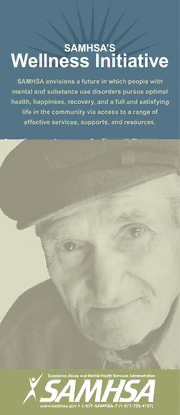
SAMHSA's Wellness Initiative PDF
Preview SAMHSA's Wellness Initiative
SAMHSA’S Wellness Initiative SAMHSA envisions a future in which people with mental and substance use disorders pursue optimal health, happiness, recovery, and a full and satisfying life in the community via access to a range of effective services, supports, and resources. Wellness is physical, emotional, social, occupational, intellectual, financial, environmental, and spiritual. WHAT IS WELLNESS? Wellness incorporates many dimensions of health: physical, emotional, financial, social, occupational, intellectual, environmental, and spiritual. Dr. Sarah R. Linde-Freucht of the U.S. Department of Health and Human Services said that “health relates broadly to how an individual functions in one’s life, the quality of one’s relationships, and how one adapts to change and copes with difficulties.” The new focus on wellness highlights the importance of recovery from mental illnesses. By pursuing wellness, we can reduce the disparity in mortality for people with THE EIGHT DIMENSIONS OF WELLNESS* What makes us well differs from person to mental illnesses, which is far greater than any other • PHYSICAL—Recognizing the need for physical person. How do the Eight Dimensions of population.* activity, diet, sleep, and nutrition. Wellness apply to you? • EMOTIONAL—Coping effectively with life and “People with mental illnesses creating satisfying relationships. die decades earlier than the • SOCIAL—Developing a sense of connection, SAMHSA’S WELLNESS INITIATIVE belonging, and a well-developed support system. general population.” The Federal Government has spearheaded a • OCCUPATIONAL—Personal satisfaction and major cross-governmental, public/private initiative —National Association of enrichment derived from one’s work. to transform delivery of the Nation’s mental health State Mental Health Program Directors • INTELLECTUAL—Recognizing creative abilities services into a system based on the expectation of and finding ways to expand knowledge and skills. recovery. WHY IS WELLNESS IMPORTANT? • FINANCIAL—Satisfaction with current and future Recent studies have found that increased morbidity Through its Wellness Initiative, SAMHSA pledges financial situations. and mortality are largely due to treatable medical to promote wellness for people with mental and conditions that are caused by modifiable risk factors • ENVIRONMENTAL—Good health by occupying substance use disorders by motivating individuals, such as smoking, obesity, substance use, and pleasant, stimulating environments that support organizations, and communities to take action and inadequate access to medical care.** well-being. work toward improved quality of life, cardiovascular • SPIRITUAL—Expanding our sense of purpose health, and decreased early mortality rates. *Source: Institute of Medicine. (2005). Improving the Quality of and meaning in life. Health Care for Mental Health and Substance. **Source: National Association of State Mental Health Program To learn more and sign the Pledge for Wellness, *Source: Swarbrick, M. (2006). A wellness approach. Psychiatric Directors. (2008). Measurement of Health Status for People with Serious Mental Illness. Rehabilitation Journal, 29(4), 311–314. visit http://www.samhsa.gov/wellness. FOR MORE Information • Substance Abuse and Mental Health Services Administration (SAMHSA) http://www.samhsa.gov • FDA Office of Women’s Health http://www.fda.gov/womens • Million Hearts™ http://www.millionhearts.hhs.gov • U.S. Department of Health and Human Services http://www.hhs.gov • Center for Psychiatric Rehabilitation http://www.bu.edu/cpr • National Alliance on Mental Illness (NAMI) 1–800–950–NAMI (1–800–950–6264); Support SAMHSA’s efforts by signing http://www.nami.org the PLEDGE FOR WELLNESS • The National Empowerment Center to promote wellness for people with 1–800–POWER2U (1–800–769–3728); http://www.power2u.org mental and substance use disorders by • The National Wellness Institute taking action to improve the quality of http://www.nationalwellness.org life and reduce early mortality. • Health Finder http://www.healthfinder.gov • National Recovery Month http://www.recoverymonth.gov • Healthy People 2020 http://www.healthypeople.gov/2020 • FAVOR (Faces & Voices of Recovery) http://www.facesandvoicesofrecovery.org SAMHSA’S Wellness Initiative The views, opinions, and content of this publication are those of the author and do not necessarily reflect the views, opinions, or policies of SAMHSA or HHS. Inclusion on this list of resources does not constitute endorsement by SAMHSA or HHS. FOR INFORMATION, CONTACT: SAMHSA’s Wellness Initiative 1 Choke Cherry Road Rockville, MD 20857 E-mail: [email protected] HHS Publication No. (SMA) 12-4565 Substance Abuse and Mental Health Services Administration First printed 2010. Revised 2012.
